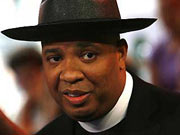 I tuned into the encore of F/X’s “Damages” premiere last night, hoping for a new slice of great material at the crossroads of faith and culture. I love law shows, and in this one Glenn Close plays Patricia Hewes, founder of the powerful Hewes & Associates litigation firm. Rose Byrne (“28 Weeks Later,” “The Dead Girl”) plays Ellen Parsons, an ambitious young attorney recruited to the firm (and its competitor) amidst some curiously coincidental circumstances regarding her family and friends.
I tuned into the encore of F/X’s “Damages” premiere last night, hoping for a new slice of great material at the crossroads of faith and culture. I love law shows, and in this one Glenn Close plays Patricia Hewes, founder of the powerful Hewes & Associates litigation firm. Rose Byrne (“28 Weeks Later,” “The Dead Girl”) plays Ellen Parsons, an ambitious young attorney recruited to the firm (and its competitor) amidst some curiously coincidental circumstances regarding her family and friends.
Other characters were introduced in the pilot–just enough to create some intrigue for the next show (which airs tonight on F/X at 10). Ted Danson’s Arthur Frobisher is the villain (or at least the opponent) who has made a fortune at the expense of his employees. “Damages” is an ongoing serial a la “24,” which is a good thing because there wasn’t much that was pretty about the first show.
From the opening, it’s clear that “Damages,” will be different than other law or cop shows on TV such as “Law and Order” or its spinoffs. Absent are the bright colors of “Boston Legal” or “CSI: Miami.” The opening credits are black-and-white with shades of red (representing blood). The opening scene featured a half-naked woman running dazed and confused through the streets, in shock from what appears to be a rape. In the next scene she’s in an interrogation room.
“Damages” is darker and grittier than any other television law show. It is vulgar and occasionally obscene, with numerous curse words and one hot-and-heavy sex scene. For many people of faith, it will take a lot of work to hang in there in hopes of some redemptive qualities as the weeks go on.
“High stakes litigation is a long and painful process,” Hewes instructs her group of class action clients. She also preaches her version of family ethics to Parsons: “Love’s nothing. Love’s easy. It’s what you do after that that’s the hard part.” Working people will certainly relate to the challenge of balancing work, home, faith, and family.
I enjoyed two things about the show. First, it was commercial-free. Second, it’s not simple. Real heroics require significant obstacles, and authentic redemptive activity usually involves complex situations where personal ethics clash with the profit opportunities of the workplace. Therein lies some possible takeaways for the spiritual viewer, but it’ll take some work.
But then again, Christians often overlook the fact that Jesus got a bit vulgar when he confronted the religious types of his day, and His style wasn’t always pretty, and it was usually “out of the box.” That may be stretching it, though–and if there is a Christ-figure (or even a Judas) in this plot, it’s too early on to know who it’ll be.


